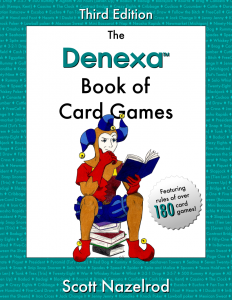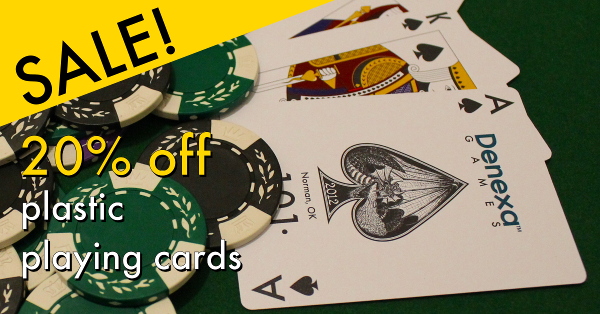Pitch
Pitch (also known as Setback) is a trick-taking game played in the United States. In the Midwest and central parts of the United States, it is most commonly played as a partnership game. On the coasts, Pitch is more frequently played as a cutthroat, every-player-for-themselves game, often for money. The four-player partnership game is described here.
Pitch is essentially an American adaptation of the old English pub game All Fours. Pitch uses a more conventional bidding system to fix the trump suit, rather than the more complicated procedure found in All Fours.
Object of Pitch
The object of Pitch is to be the first team to score 21 or more points by successfully fulfilling bids.
Setup
Pitch is played with a standard 52-card deck of playing cards. Because you need a deck of cards that can stand up to whatever you throw at it, make sure you always use Denexa 100% Plastic Playing Cards.
Partnerships may be determined by any agreed-upon method, including mutual agreement or any sort of random process. Partners should sit across from each other, so as play proceeds clockwise, each player’s turn is followed by one of their opponents’ turns.
Shuffle and deal six cards to each player, in two batches of three. The stub is set aside and is not used for the rest of the hand.
Game play
Game play in Pitch revolves around scoring points for the following achievements:
- High—playing the highest trump in play during the hand,
- Low—capturing the lowest trump in play during the hand,
- Jack—capturing the jack of trumps,
- Game—accruing the highest total of cards captured during the hand, scoring as follows: ten for each 10, four for each ace, three for each king, two for each queen, and one for each jack. 9s and below do not count toward the game score. If the teams tie for game, the point is not scored.
Because not all of the cards are dealt on each hand, the trump scoring for High is not necessarily the ace, and the trump scoring for Low is not necessarily the two. Likewise, the point for Jack sometimes goes unscored, since the jack of trumps is not always in play.
Bidding
The right to choose the trump suit is given to the player who makes the highest bid. Available bids in Pitch are two, three, four, and smudge. The first three of these bids represents a commitment to score at least that many points on the following hand. A bid of smudge, the highest bid, is a bid to score four points plus all the tricks. However, by bidding four or smudge, you may unknowingly get yourself into a situation where it is impossible to make your bid. The jack of trumps is not always dealt, and in hands where this is the case, the point for Jack is not scored, meaning the most you can score is three. Even if you take all six tricks, you will not make your contract.
Bidding begins with the player to the dealer’s left. They may either bid or pass. Bidding continues clockwise, with each player passing or making a higher bid than the players before them. The dealer makes the last bid, and has the right to bid the same as the player before them, called stealing the bid. If every player passes, the dealer is compelled to make a bid of two, called a force bid. There is only one round of bidding; the high bid stands after the dealer makes their bid. The player making the high bid is called the pitcher.
Play of the hand
The pitcher leads to the first trick. The suit of the card they lead off with becomes the trump suit. Each other player plays to the trick in turn, proceeding clockwise. Each player must follow suit, unless they are unable, in which case they may play any card. Additionally, playing a trump is always allowed, even if the player could follow suit. The player who plays the highest card of the suit led (aces rank high) collects the trick, unless a trump is played, in which case the highest trump played wins the trick. Collected tricks are not added to the player’s hand, but rather a score pile shared with their partner. The winner of each trick leads to the next one.
Ending the hand
When all six tricks have been played, the hands are scored. If the pitcher’s team makes at least as many points (as described above) as they bid, they score one point for each point made. When a bid of smudge is made, the pitcher’s team scores five points (the four points they scored, plus one for the smudge). If the pitcher’s team failed to make their bid, they are said to have been set. They are set back the amount of their bid instead, i.e., the value of their bid is deducted from their score. Regardless of if the pitcher’s team makes their bid or not, their opponents always score the number of points they made.
The deal passes to the left, the cards are shuffled, and new hands are dealt. Game play continues until a partnership reaches a score of 21 or more after having successfully made their bid. Note that it’s possible for a team to score above 21 while not being the high bidders. In this case, the team must remain above 21 points and successfully make a bid before they can win. (In some cases, the winning team may even have a lower score than their opponents, simply because they made a winning bid and crossed 21 before their opponents, already over 21, could.)
See also
Pitch is one of those games with lots of variations—tell us how you like to play in the comments!


